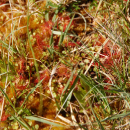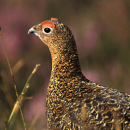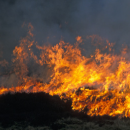19th March 2018
Next generation gamekeepers have put the recently launched national peatland restoration toolkit through its paces.
Students at Newton Rigg College, Penrith are at the cutting edge of best moorland practice rehearsed on the College’s 5,000 acres of moorland at Shap, Cumbria. The live outdoor classroom gives students a true sense of the reality of gamekeeping and conservation.

The new peatland restoration toolkit describes a range of things to look out for and actions that can be taken to help improve the deep peat habitat including drain blocking, restoration burning and cutting to reduce heather dominance, rewetting of peat and reintroduction of blanket bog species.
As well as great habitat for grouse and grazing for sheep, blanket bog in good health provides clean drinking water, protects against flooding, is good for insects and birds and mitigates climate change by locking up the greenhouse gas, carbon dioxide.
Students out on Shap this week identified the current state of an area of peatland, using the toolkit to guide them through the process, and had to make an informed decision whether restoration burning would be appropriate to further its improvement.

Curtis Mossop, senior lecturer and head of the Game and Wildlife Management department at Newton Rigg College, said: “This new approach to understanding blanket bog conditions and knowing the appropriate peatland restoration practices to adopt is vitally important in safeguarding healthy peatland for future generations. I was particularly impressed with the high standard of skill shown during the burning techniques undertaken by all students which left the understory of mosses intact.”
Student, Amy Little said: “Whilst out on our recent field assessment, we first used a stick to see if the peat was over 40 cms deep. We then agreed that the abundance of heather was too great for top-notch active blanket bog. We decided that a well-controlled ‘cool’ burn over the top to remove the shading and dense canopy would let in the light and rainwater to give bog plants a better chance. We will follow up this action by introducing peat forming mosses to speed up the improvement.”
“We relish going out onto Shap moor and putting our classroom knowledge to the test in a live situation, it is the best learning environment possible. This was the first time I had conducted heather burning and I gained fantastic hands-on experience of how to carry out controlled burning whilst ensuring no risk of wildfires or damage to moorland species in the process.”
Amanda Anderson, director of the Moorland Association, chaired the team tasked with devising the toolkit to help deliver Defra’s Blanket Bog Restoration Strategy.
Mrs Anderson said: “Newton Rigg game keeping students are our future moorland custodians. We are delighted the college has taken up the toolkit as part of their course literature and put it through its paces. It seems to have passed muster! The students will be well equipped to ensure a range of really important benefits for society from the moors where they spend their careers.
“Working in conjunction with Natural England and our members, this toolkit is now playing an important role in developing long-term vegetation management plans across thousands of acres of blanket bog.”
The new peatland restoration toolkit has been collaboratively produced by representatives of the Uplands Management Group in response to a request from Defra’s Uplands Stakeholder Forum forbest practice guidance.








